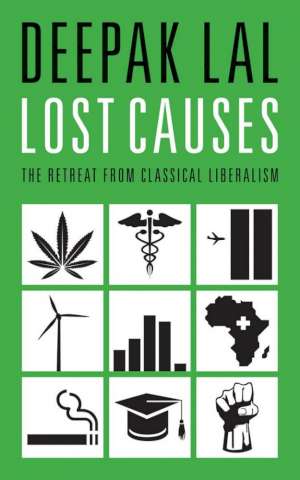30 April 2013
Lost Causes
The Retreat from Classical Liberalism
Deepak Lal
2012, Biteback, 288 pages, £14.99
ISBN 9781849542883
Reviewer: Dame Kate Barker

This set of ten re-published essays, with introduction, is a bracing challenge to woolly left-inclined thought. The earliest essay, on universities, dates from 1989; the most recent, dealing with the financial crisis, was written in 2010. The overarching theme running through them is the need to resist the ‘predatory state’ and Lal’s reason for re-publication is that this concern has not receded since he started writing.
The article covering the predatory state sets out his view that, as a result of responding to the median middle-class voter, tax and spend take up too much of the economy and are inherently inefficient. This has come about due to a shift to participative democracy, in which groups are continually consulted and produce policy recommendations in their own short-term interests. He is strongly in favour of a smaller, less intrusive state, preferably financed by a flat tax system, and considers that globalisation may well force recognition that the present system cannot endure.
It is certainly interesting to look back at the older essays in the light of subsequent policy developments. So for example the piece on universities discusses the desirability of a shift to a system of financial support that closely resembles the student loans that have just been introduced. However, his proposals were perhaps more generous than today’s in including larger means-tested scholarships. And the motivation, which was to free universities from much central planning and regulation, has only been partially followed through.
An equally prescient piece is the discussion of EMU, written in 1999 just after the birth of the euro. Lal lists a number of ways in which the euro could come under pressure and thus weaken, not strengthen, the political unity that ought to have come first. He may also prove to have been right in arguing that ultimately tensions around the euro could force structural reforms in the Euro Area.
But these essays are not all chosen because they have subsequently become the received wisdom. On health, Lal argues for the replacement of the NHS by a national health insurance scheme with doctors, nurses and hospitals privately provided; whereas the Olympics opening ceremony has just reinforced the tax-funded NHS’s place in the UK psyche. And it seems hard to accept, in the essay opposing tobacco tax, that there are no impacts from secondary cigarette smoke. On global warming, Lal strongly objects to the developed world attempting to restrain the newly developed in the name of global warming. This argument can readily be accepted, but perhaps less so the equally strong challenge to the scientific evidence of global warming - but on this topic I suspect most economists have too little expertise to judge who is in the right.
The final essay, on the financial crisis, is more in tune with current policy. But it adds a timely warning against a situation in which financial institutions come to serve their regulators, rather than focusing on innovations to benefit their customers.
This book is enjoyable and stimulates reconsideration of some familiar issues. It can be summed up by the proposition that in the UK we don’t think enough about freedom from the state, because we look too much for freedom guaranteed by it.
